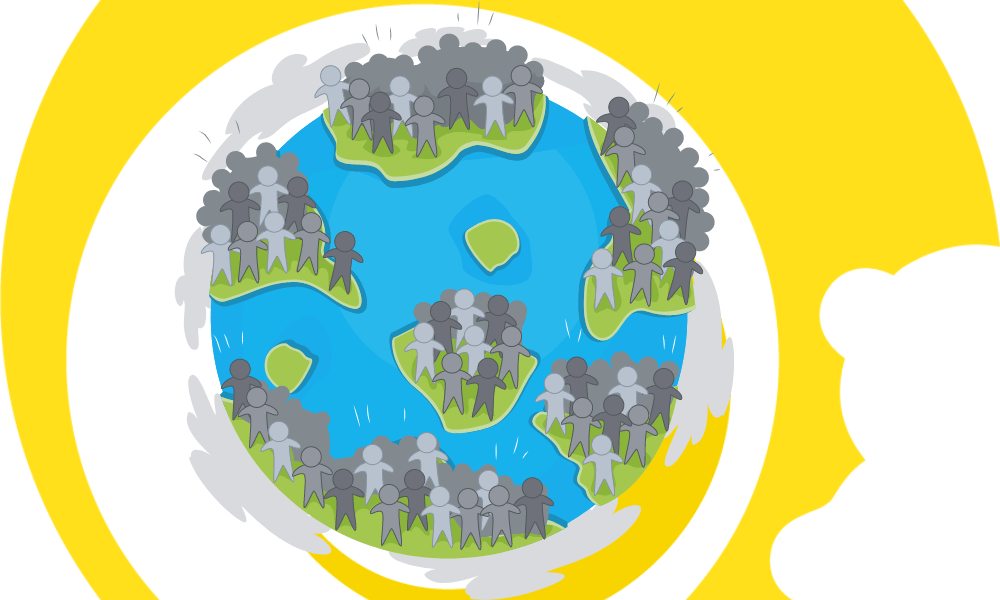Diary
World Population Day: Why we Need it Today
- 08th Jul 2022
Dear Diary,
The world marvels at the advancement of the healthcare industry.
The modern-day healthcare system has increased the average lifespan of people. It has reduced maternal mortality and given the world vaccines for various diseases.
Other technological advancements have made our lives and communication technology has helped us connect better and faster with each other.
But that is the golden side of the modern world! There are some pressing issues that need our attention.
World Population Day is one such day designated by the UN to draw our attention to the global population that affects family planning, poverty, and gender gaps.
Introduction:
Over 200 years ago, the world population reached the first billion. But it took the world nearly 123 years, in 1927, to double to 2 billion and a quarter of the time to reach 3 billion in the year 1960.
Since then, the world population has put pressure on biodiversity and human communities. As a result, nearly 1.1 billion people worldwide lack access to water. Due to water shortage, 2.4 billion people have problems such as inadequate sanitation, and exposure to diseases like cholera and typhoid.
The rivers, lakes, and other water ecosystems are either too polluted or have become stressed. The global growth of the world population has given rise to unemployment. South Africa has the highest rate of unemployment at 29.2%, as per the data collected by World Bank in 2020.
Background:
World Population Day was designated in 1989 by the United Nations Development Programme to focus our attention on the urgency and importance of population issues.
It is now widely celebrated of 11th of July each year.
In December 1990, United Nations General Assembly decided to observe World Population Day make people aware of the population explosion and how it is causing harm to the environment and our overall development.
The theme for 2022:
The world has already touched the 8 billion mark.
But the UN is trying to take steps toward a resilient future and harnessing opportunities and ensuring rights and choices for all. And that is the theme for the year 2022.
“A World of 8 billion: Towards Resilient Future for all Harnessing Opportunities and Ensuing Rights and Choices for all”.
The theme for this year suggests a threat to mother nature and humanity and how we all need to take a step ahead together to control it.
UNFPA goals:
United Nations Population Fund (UNFPA) aims to strengthen the national health systems and advocate policies supporting family planning.
The organization believes that advocating family planning is not just about human rights. It also empowers women, tackles the adversities of poverty, and works toward achieving sustainable growth.
The UNFPA supports the policies and benefits of family planning in developing countries by ensuring the following:
-
Reliable supply of modern contraception
-
Strengthening national health systems
-
Promoting gender equality
The United Nations has listed nine standards to uphold human rights in family planning. They are:
-
Accessibility: The countries must ensure all the family planning services and commodities accessibility to the population.
-
Availability: Ensuring the availability of all family planning commodities and services.
-
Acceptability: Contraceptive services’ information must be provided with dignity. Equal respect should be given to modern medical ethics and the cultures of the people.
-
Non-discrimination: No discrimination based on sex, race, religion, language nationality, age, economic status, etc is allowed.
-
Good quality: All the information regarding family planning must be provided correctly and scientifically.
-
Informed decision-making: People must be empowered to make informed reproductive choices, with full autonomy, without pressure or coercion, or misinterpretation.
-
Privacy and confidentiality: People must enjoy the right to privacy when seeking information and services.
-
Participation: The governing bodies of the countries are obligated to ensure active and informed participation by the people in the decision-making.
-
Accountability: The education system, the policymakers, and health systems must be accountable to serve the people and help the larger humanitarian goal.
What can you do to achieve the goal?
Some of the ways we can contribute to controlling the population explosion are:
-
Education: The focus on education cannot be enough. Educate people and teenage children regarding sex and contraception. Without taboo.
-
Adoption: Do not consider it a bad thing! We should not consider this a taboo either. Learn more about it.
-
Know about your national family planning policies and how they can benefit people around you.
-
Join communities or services that work towards family planning, mother, and childcare. Let people around you know about such organizations. Help somebody in need.
-
Restrict child marriages
-
Educate and empower the girl children
-
Fight for women’s rights,’ assuring all of them can have a choice in their own pregnancies.
-
Provide correct and scientific information regarding safe motherhood.
-
Release social stigmas
Conclusion:
Everyone plays a significant role in the growth of the human population. But the lack of empowerment, education, and access to healthcare are affected disproportionately.
The world needs to work harder towards achieving accessibility of education, reproductive healthcare, and gender equality for all.
We all are in this together and we need to have proper tools, information, and autonomy to make the best choices for ourselves and our planet.
That’s all I have for now,
I will write to you soon.
Take care!
Recent Post
- Our Secret Way to Celebrate National Cocoa Day December 16, 2022
- Healthy Coffee: Your Coffee is Helping You October 14, 2022
- Sharpen the Brain: Top 6 ways to Improve Brain Health October 7, 2022
- Learn about Traveling this World Tourism Day September 30, 2022
- Let’s Talk about International Day of Peace September 23, 2022


